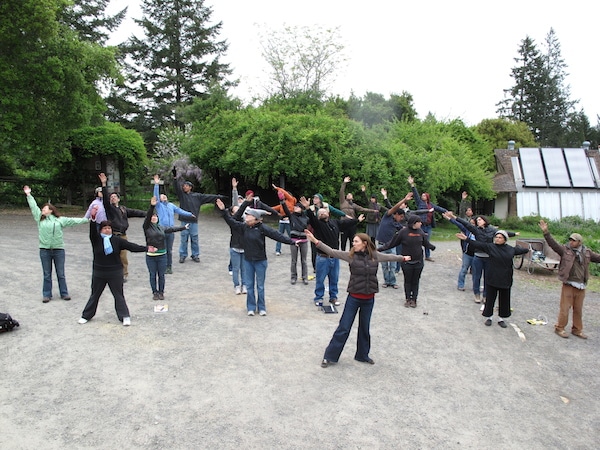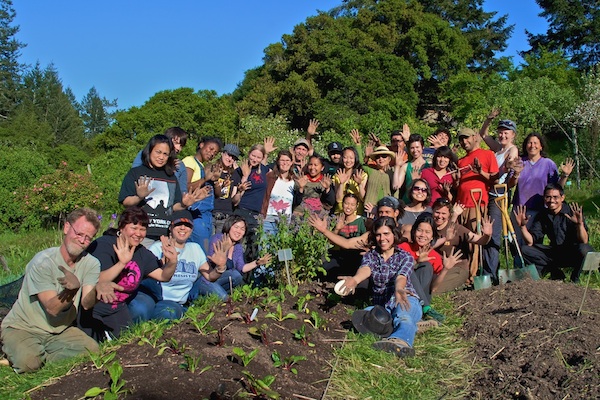
Permaculture for the people is a community land design workshop for groups who have gained access to land and want to improve the land and offer programs for a larger community.
One of the most powerful instruments of oppression has been to tear people away from the land. From the perspective of healing and rebuilding dispossessed communities comes Liberation Permaculture – a read of Permaculture that is about self-reclamation, cultural survival and independence. A direct challenge to the current social, economic and political system, it asserts that people have the right to draw upon traditional methods of living in balance with their environment to design for community resilience and regain social, political and economic independence. This concept inspired a training program called “Permaculture for the People,” developed by OAEC and the Movement Generation Justice & Ecology Project (MG).

Each year, MG brings together activists and artists from social justice organizations around the nation to participate in two three-day Justice & Ecology Retreats at the Occidental Arts & Ecology Center. Retreat participants then have the opportunity to implement regenerative designs in their communities by participating in a 2-week long “Permaculture for the People” design course, followed by a one- to two-year follow-up support process with MG and OAEC.
History of Permaculture for the People
In 2006, OAEC and the Movement Generation Justice & Ecology Project (MG)—an organization that bridges the gap between current social and ecological issues in working class communities in the Bay Area—began to discuss the question of how to actively bring the principles of permaculture design to whole communities, especially the marginalized and displaced. The conversation illuminated the fact that social justice issues (such as a lack of jobs and affordable housing, the loss of land sovereignty, and unequal access to healthcare) and the worldwide ecological crisis stem from the same problem—the mismanagement and dysfunction of the global-scale economic system.
With a “think it yourself” methodology for creating small-scale solutions to provide for their own needs, Bay Area communities are working to overcome ecological and social degradation at the regional scale. This led to a 2-week design intensive called “Permaculture for the People.” The course was offered to targeted participants—groups of organizing staff and member-leaders from community-based social justice organizations such as PODER (San Francisco) and Urban Tilth (Richmond).
The participants’ design projects centered on the physical sites occupied by the participating organizations, with an understanding that participants would incorporate the principles of Permaculture into their social justice work after the course was over. The course was unique in that it was divided between a rural and an urban setting. After a week at OAEC, the group made its way back to the city, where participants spent time doing planning and sector mapping at their design sites.
MG and OAEC encouraged participants to stay in touch after the course, especially about how to implement resilience-based strategies in their work in an ongoing way. This opened the door for several collaborations, such as Urban Tilth’s “all hands on deck” work parties to turn an abandoned school’s baseball field into a community farm.
Liberation Permaculture
As Permaculture Design represents a systems-thinking approach to problem solving, Liberation Permaculture is the notion that oppressed people can draw upon traditional methods of living in balance with their home ecosystem to build community resilience and regain social, political and economic independence. “Permaculture, being a design system for creating regenerative human settlements, is a key instrument for communities in developing small-scale solutions,” says Carla Pérez, co-director of the Movement Generation Justice & Ecology Project.
The current “long chain” economic model of supply and demand and its often toxic side effects, such as environmentally hazardous resource extraction and cheap labor, most deeply affect marginalized communities. Permaculture, on the other hand, is a “zero-waste model”—it challenges us to use resources in our immediate surroundings instead of relying on an unjust, unaccountable system of mass production and distribution for our needs. As opposed to the individualism and compartmentalization of the global system, Permaculture is based on collaboration and care for all People.
OAEC’s collaboration with the Movement Generation Justice & Ecology Project represents our burgeoning ambition to foster community-wide resilience by influencing targeted community “change agents.”
OAEC sees Permaculture Design as one key framework for envisioning and enacting a transition away from destructive, global-scale ecological and socioeconomic practices.







